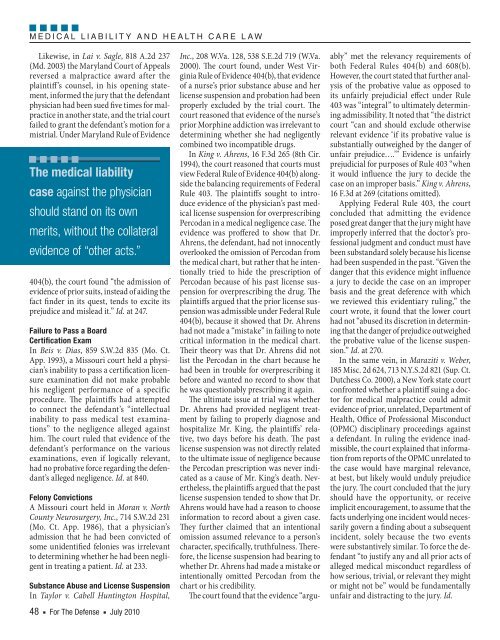For The Defense, July 2010 - DRI Today
For The Defense, July 2010 - DRI Today
For The Defense, July 2010 - DRI Today
- No tags were found...
Create successful ePaper yourself
Turn your PDF publications into a flip-book with our unique Google optimized e-Paper software.
M E D I C A L L I A B I L I T Y A N D H E A LT H C A R E L A WLikewise, in Lai v. Sagle, 818 A.2d 237(Md. 2003) the Maryland Court of Appealsreversed a malpractice award after theplaintiff’s counsel, in his opening statement,informed the jury that the defendantphysician had been sued five times for malpracticein another state, and the trial courtfailed to grant the defendant’s motion for amistrial. Under Maryland Rule of Evidence<strong>The</strong> medical liabilitycase against the physicianshould stand on its ownmerits, without the collateralevidence of “other acts.”404(b), the court found “the admission ofevidence of prior suits, instead of aiding thefact finder in its quest, tends to excite itsprejudice and mislead it.” Id. at 247.Failure to Pass a BoardCertification ExamIn Beis v. Dias, 859 S.W.2d 835 (Mo. Ct.App. 1993), a Missouri court held a physician’sinability to pass a certification licensureexamination did not make probablehis negligent performance of a specificprocedure. <strong>The</strong> plaintiffs had attemptedto connect the defendant’s “intellectualinability to pass medical test examinations”to the negligence alleged againsthim. <strong>The</strong> court ruled that evidence of thedefendant’s performance on the variousexaminations, even if logically relevant,had no probative force regarding the defendant’salleged negligence. Id. at 840.Felony ConvictionsA Missouri court held in Moran v. NorthCounty Neurosurgery, Inc., 714 S.W.2d 231(Mo. Ct. App. 1986), that a physician’sadmission that he had been convicted ofsome unidentified felonies was irrelevantto determining whether he had been negligentin treating a patient. Id. at 233.Substance Abuse and License SuspensionIn Taylor v. Cabell Huntington Hospital,48 n <strong>For</strong> <strong>The</strong> <strong>Defense</strong> n <strong>July</strong> <strong>2010</strong>Inc., 208 W.Va. 128, 538 S.E.2d 719 (W.Va.2000). <strong>The</strong> court found, under West VirginiaRule of Evidence 404(b), that evidenceof a nurse’s prior substance abuse and herlicense suspension and probation had beenproperly excluded by the trial court. <strong>The</strong>court reasoned that evidence of the nurse’sprior Morphine addiction was irrelevant todetermining whether she had negligentlycombined two incompatible drugs.In King v. Ahrens, 16 F.3d 265 (8th Cir.1994), the court reasoned that courts mustview Federal Rule of Evidence 404(b) alongsidethe balancing requirements of FederalRule 403. <strong>The</strong> plaintiffs sought to introduceevidence of the physician’s past medicallicense suspension for overprescribingPercodan in a medical negligence case. <strong>The</strong>evidence was proffered to show that Dr.Ahrens, the defendant, had not innocentlyoverlooked the omission of Percodan fromthe medical chart, but rather that he intentionallytried to hide the prescription ofPercodan because of his past license suspensionfor overprescribing the drug. <strong>The</strong>plaintiffs argued that the prior license suspensionwas admissible under Federal Rule404(b), because it showed that Dr. Ahrenshad not made a “mistake” in failing to notecritical information in the medical chart.<strong>The</strong>ir theory was that Dr. Ahrens did notlist the Percodan in the chart because hehad been in trouble for overprescribing itbefore and wanted no record to show thathe was questionably prescribing it again.<strong>The</strong> ultimate issue at trial was whetherDr. Ahrens had provided negligent treatmentby failing to properly diagnose andhospitalize Mr. King, the plaintiffs’ relative,two days before his death. <strong>The</strong> pastlicense suspension was not directly relatedto the ultimate issue of negligence becausethe Percodan prescription was never indicatedas a cause of Mr. King’s death. Nevertheless,the plaintiffs argued that the pastlicense suspension tended to show that Dr.Ahrens would have had a reason to chooseinformation to record about a given case.<strong>The</strong>y further claimed that an intentionalomission assumed relevance to a person’scharacter, specifically, truthfulness. <strong>The</strong>refore,the license suspension had bearing towhether Dr. Ahrens had made a mistake orintentionally omitted Percodan from thechart or his credibility.<strong>The</strong> court found that the evidence “arguably”met the relevancy requirements ofboth Federal Rules 404(b) and 608(b).However, the court stated that further analysisof the probative value as opposed toits unfairly prejudicial effect under Rule403 was “integral” to ultimately determiningadmissibility. It noted that “the districtcourt “can and should exclude otherwiserelevant evidence ‘if its probative value issubstantially outweighed by the danger ofunfair prejudice….’” Evidence is unfairlyprejudicial for purposes of Rule 403 “whenit would influence the jury to decide thecase on an improper basis.” King v. Ahrens,16 F.3d at 269 (citations omitted).Applying Federal Rule 403, the courtconcluded that admitting the evidenceposed great danger that the jury might haveimproperly inferred that the doctor’s professionaljudgment and conduct must havebeen substandard solely because his licensehad been suspended in the past. “Given thedanger that this evidence might influencea jury to decide the case on an improperbasis and the great deference with whichwe reviewed this evidentiary ruling,” thecourt wrote, it found that the lower courthad not “abused its discretion in determiningthat the danger of prejudice outweighedthe probative value of the license suspension.”Id. at 270.In the same vein, in Maraziti v. Weber,185 Misc. 2d 624, 713 N.Y.S.2d 821 (Sup. Ct.Dutchess Co. 2000), a New York state courtconfronted whether a plaintiff suing a doctorfor medical malpractice could admitevidence of prior, unrelated, Department ofHealth, Office of Professional Misconduct(OPMC) disciplinary proceedings againsta defendant. In ruling the evidence inadmissible,the court explained that informationfrom reports of the OPMC unrelated tothe case would have marginal relevance,at best, but likely would unduly prejudicethe jury. <strong>The</strong> court concluded that the juryshould have the opportunity, or receiveimplicit encouragement, to assume that thefacts underlying one incident would necessarilygovern a finding about a subsequentincident, solely because the two eventswere substantively similar. To force the defendant“to justify any and all prior acts ofalleged medical misconduct regardless ofhow serious, trivial, or relevant they mightor might not be” would be fundamentallyunfair and distracting to the jury. Id.
















